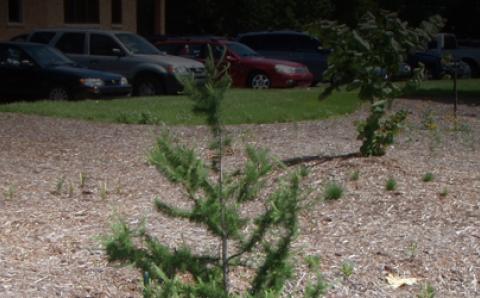“Stage theories” often help us make sense of times that we’re facing, giving us a sense of where we’ve been and where we’re headed.
Parents often rely on stage theories, whether trying to get through the “terrible twos” or as they face the teen years. In times of mourning, we may recall Elisabeth Kübler-Ross’s five stages of grief: denial, anger, bargaining, depression, and acceptance.
Stage theories have shortcomings, but I believe they can help us to better understand ourselves. So, acting on a sliver of a memory of Calvin College’s centennial celebration in 1976, I turned to the archives at Calvin’s Heritage Hall to find a sight and sound presentation that used stages to explain the college’s story. While Calvin’s story is not identical to the story of our denomination, there’s enough shared history to discover meaning.
The first stage, according to the script, was antithesis, a stage lasting from 1876 to 1934. The authors defined those decades as the tension of opposites. Rules kept us from card playing, going to movies, and dancing, to name a few. Those were things of the world; we were to be different—in opposition to society.
The second stage, pegged at 1943 to 1950, was integration. During this stage the college asked: How do faith and learning work together? How do we understand contemporary literature, with its portrayal of earthy realities apart from redemptive possibilities? How should Christians participate in scientific inquiry, even if the underlying assumptions are oppositional at times?
Commitment was the third stage, characterized by “commitment to God’s Word and the Calvinistic heritage, commitment to making that Word critically relevant in thought and life, commitment to Jesus Christ as its energizing source.”
The script then turns to the unrest of the 1960s and explains how the next stage emerged as involvement. “What came out of the unrest of the sixties is the conviction that Christians must be involved in revolutionizing the world for Christ.”
How then should we describe the stage we’re in now? I hope our present reality involves each of the four stages. While no longer an immigrant group, antithesis remains: the kingdom of our allegiance is directly opposed to the kingdom of darkness.
While our bookshelves indicate that we’ve done much to integrate faith and learning, it seems the work is never done; we’re always in an uneasy dance with the humanities, social sciences, and natural sciences.
Our commitments, I trust, are unwavering, and our passion, I hope, is to revolutionize the world for Christ.
If we look around, we see that the world is changing rapidly. Swimming with information, inundated with entertainment, and overwhelmed by technology, we find ourselves closer together in a shrinking world—yet more polarized than ever. Social norms are changing rapidly, and sometimes it seems as if we’re under assault.
A faithful response? Our current stage must be marked by discernment, as Romans 12:2 (NRSV) instructs: “Do not be conformed to this world, but be transformed by the renewing of your minds, so that you may discern what is the will of God—what is good and acceptable and perfect.”
Our tradition has often been characterized by intellectual rigor. Just open any Acts of Synod and you’ll be reminded that we excel at thinking biblically and debating vigorously through issues we’ve faced throughout each generation. But we must surround intellectual rigor with so much more. First Thessalonians 5 (NRSV) begins with the words “now concerning the times” and calls us to admonish, encourage, help the weak, be patient, seek to do good, rejoice always, pray without ceasing, give thanks, and test everything.
Yes, concerning these times we must rely on the gifts of the Spirit as we test everything. Testing shouldn’t suggest timidity or tentativeness. Rather, such discernment requires us to be wise stewards of the gifts God has entrusted to us, both in the ministries of our home congregations as well as those we share.
It requires us to continue our tradition of biblically examining the challenges society places before us. It requires us to try new ways of reaching the world for Christ. It is time for discernment.
Discernment is our task for these times, for this “stage.” But lest we think it’s all up to us, read the Thessalonians passage to its conclusion, where we find this reminder: “The one who calls you is faithful, and he will do this.”
About the Author
Steven Timmermans served as the executive director of the Christian Reformed Church in North America from 2014 to 2020.
Steven Timmermans se desempeñó como director ejecutivo de la Iglesia Cristiana Reformada en América del Norte de 2014 a 2020.
Steven Timmermans는 2014 년부터 2020 년까지 북미에서 기독교 개혁 교회의 집행 이사로 재직했습니다.








